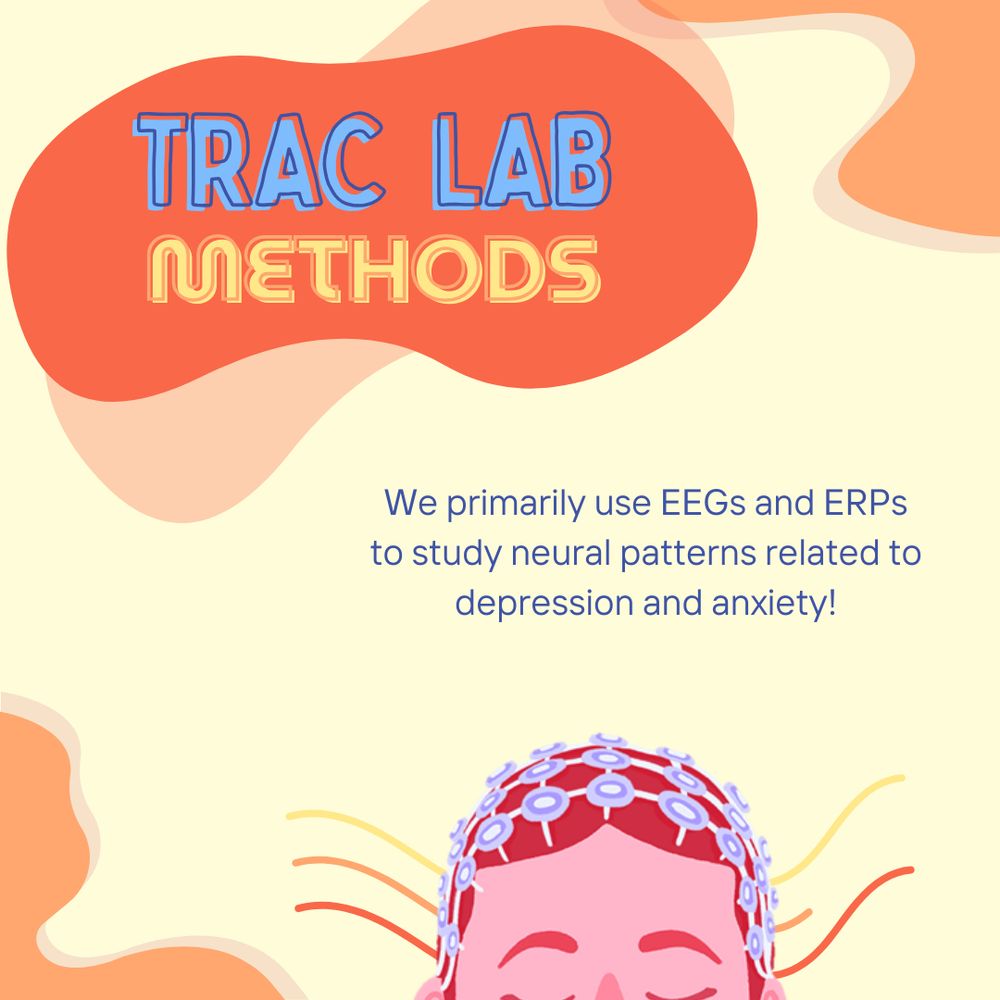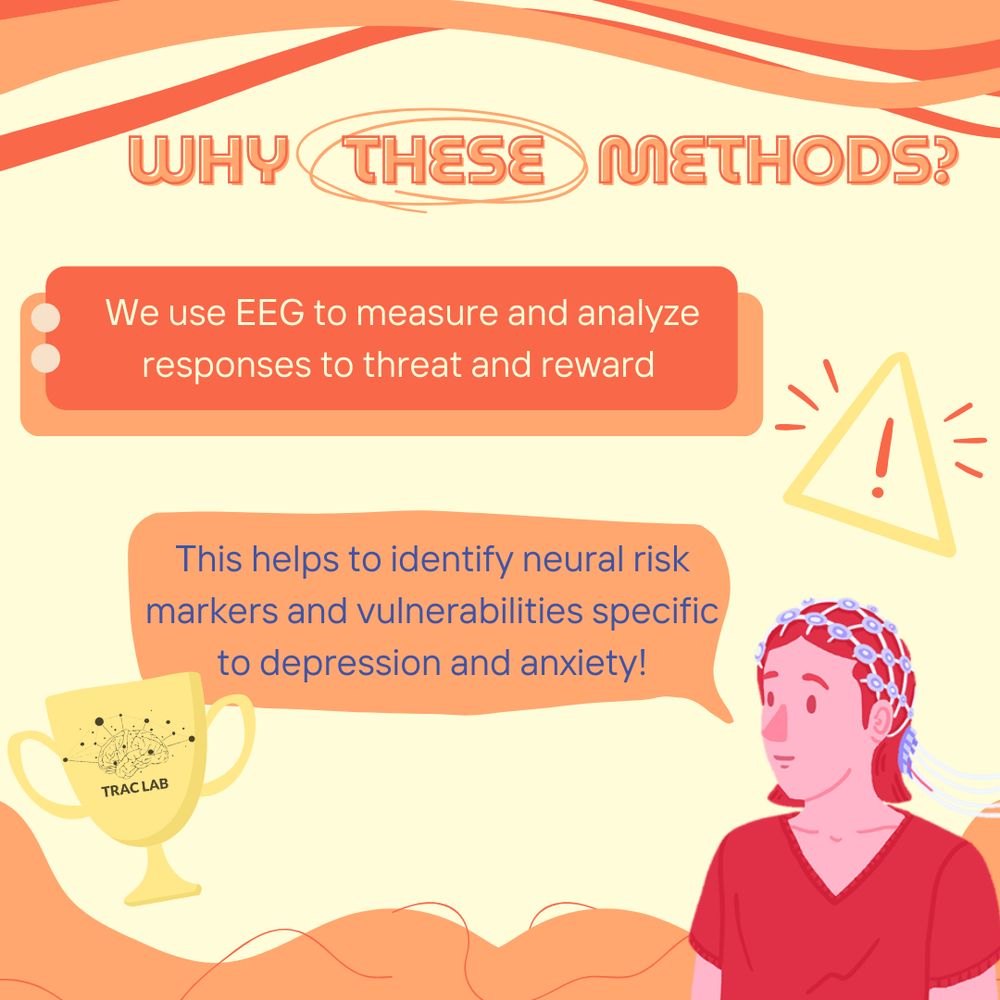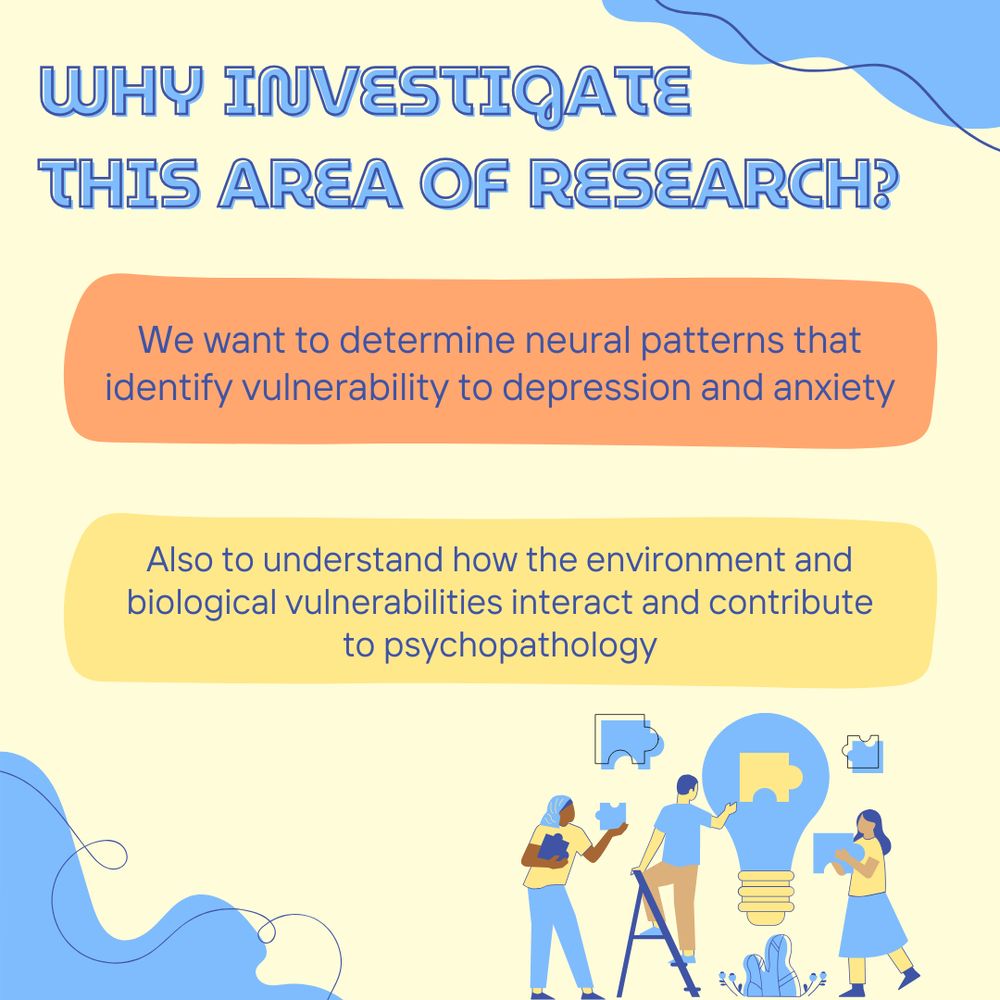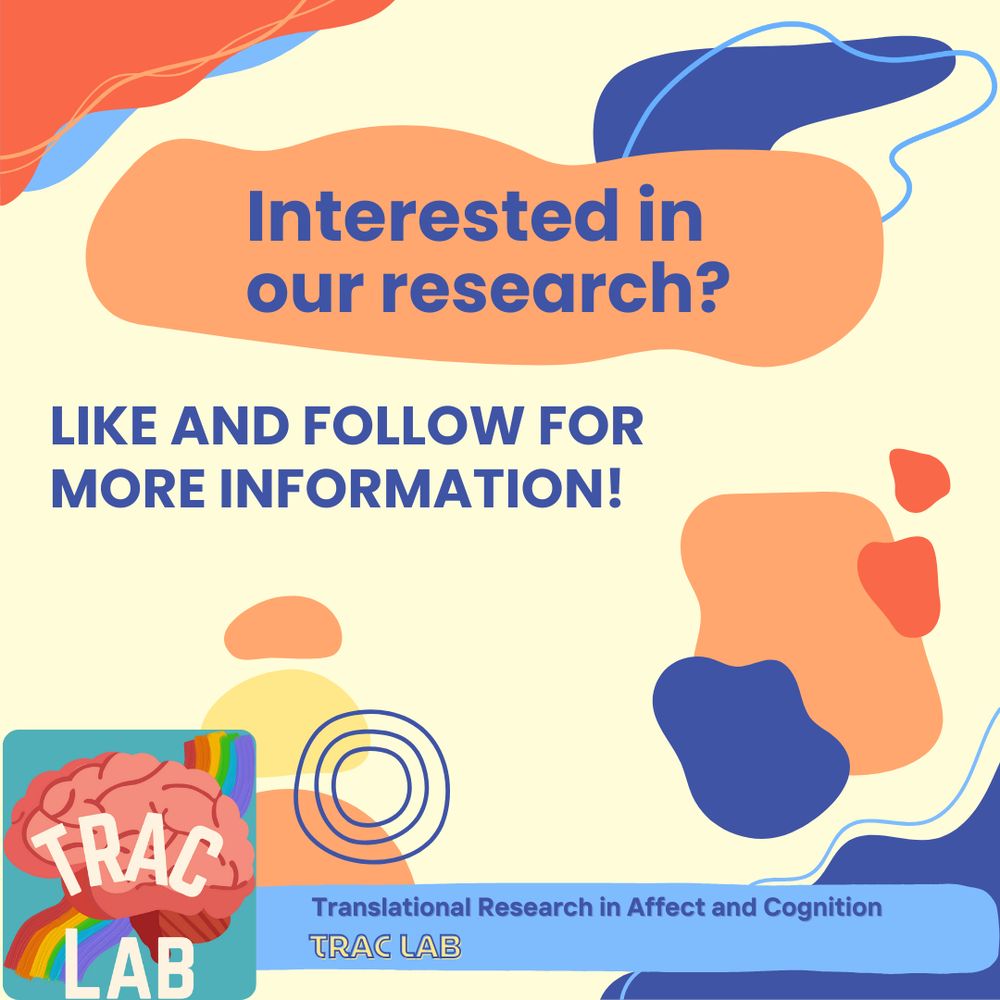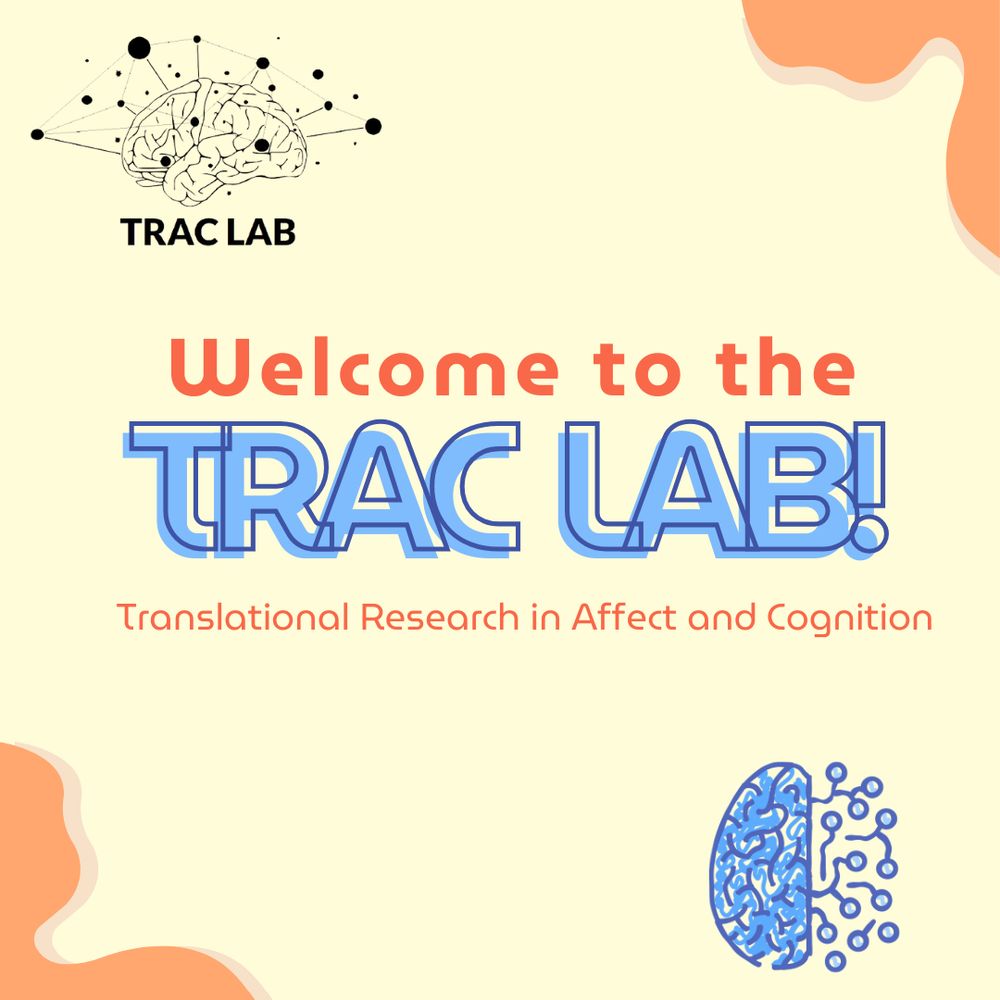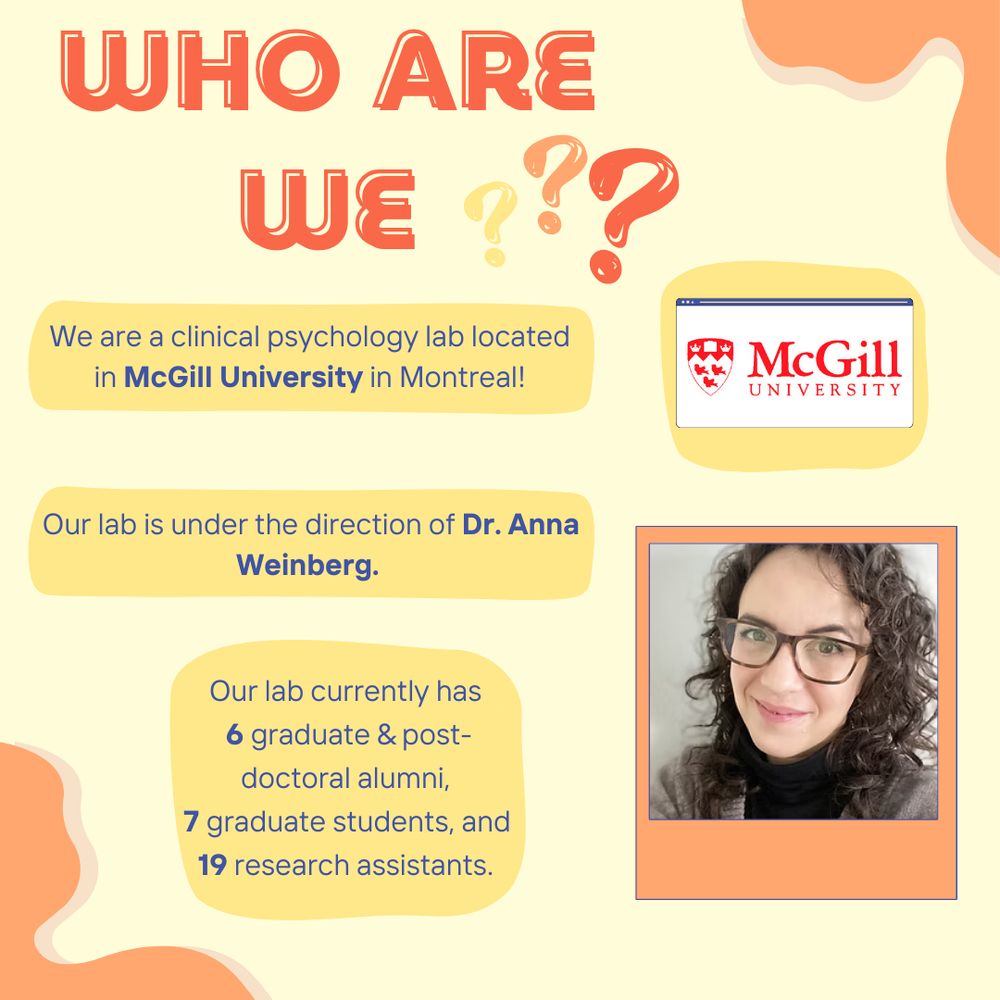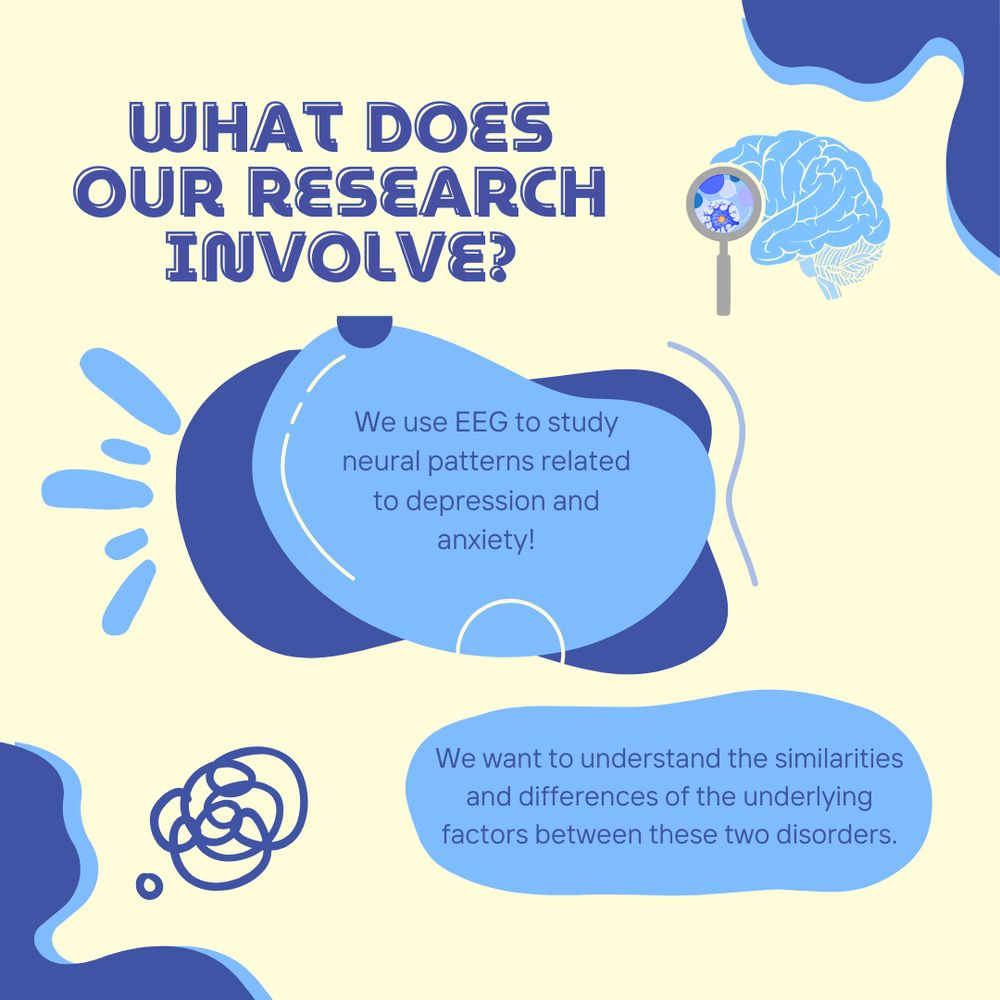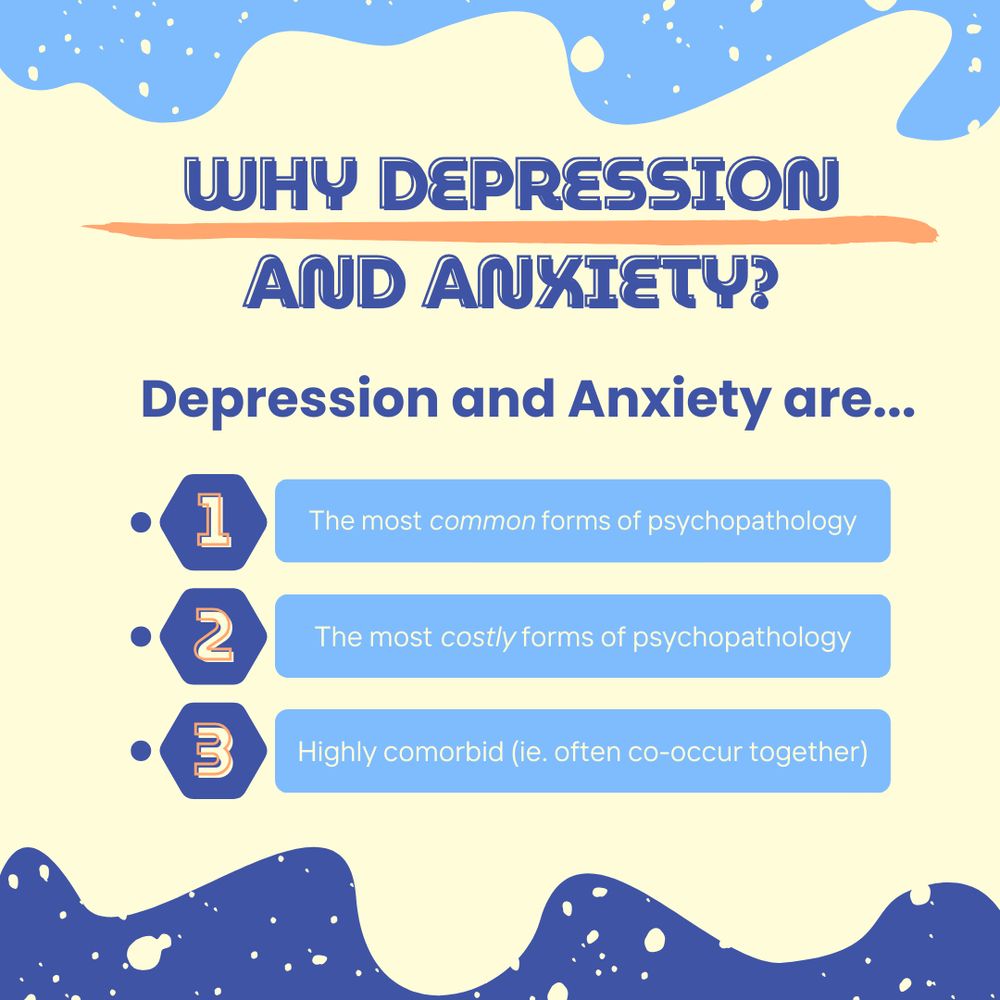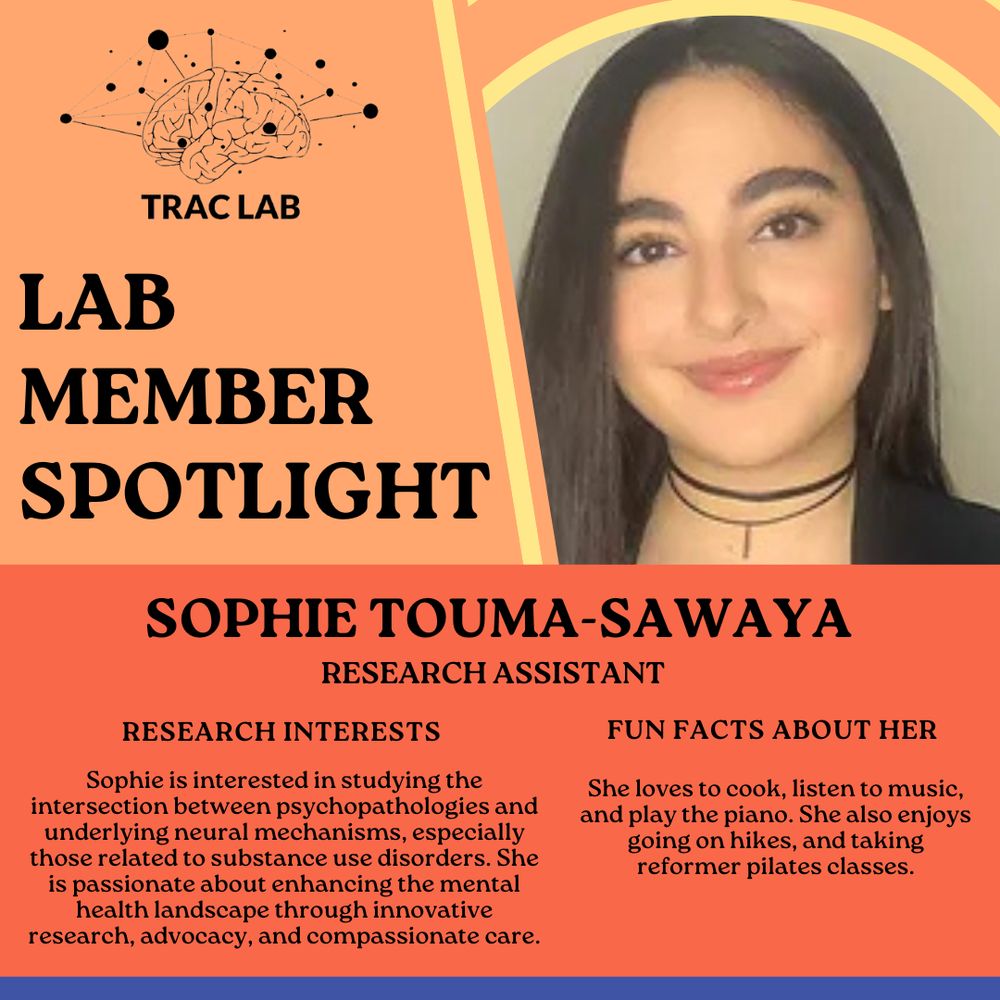
This week's RA spotlight is for Sophie, a research assistant at the lab who is particularly interested in the neural mechanisms of addiction and mental health treatment.
This year, the TRAC Lab will be posting bi-weekly posts featuring our amazing Research Assistants!
21.04.2025 02:51 — 👍 0 🔁 0 💬 0 📌 0
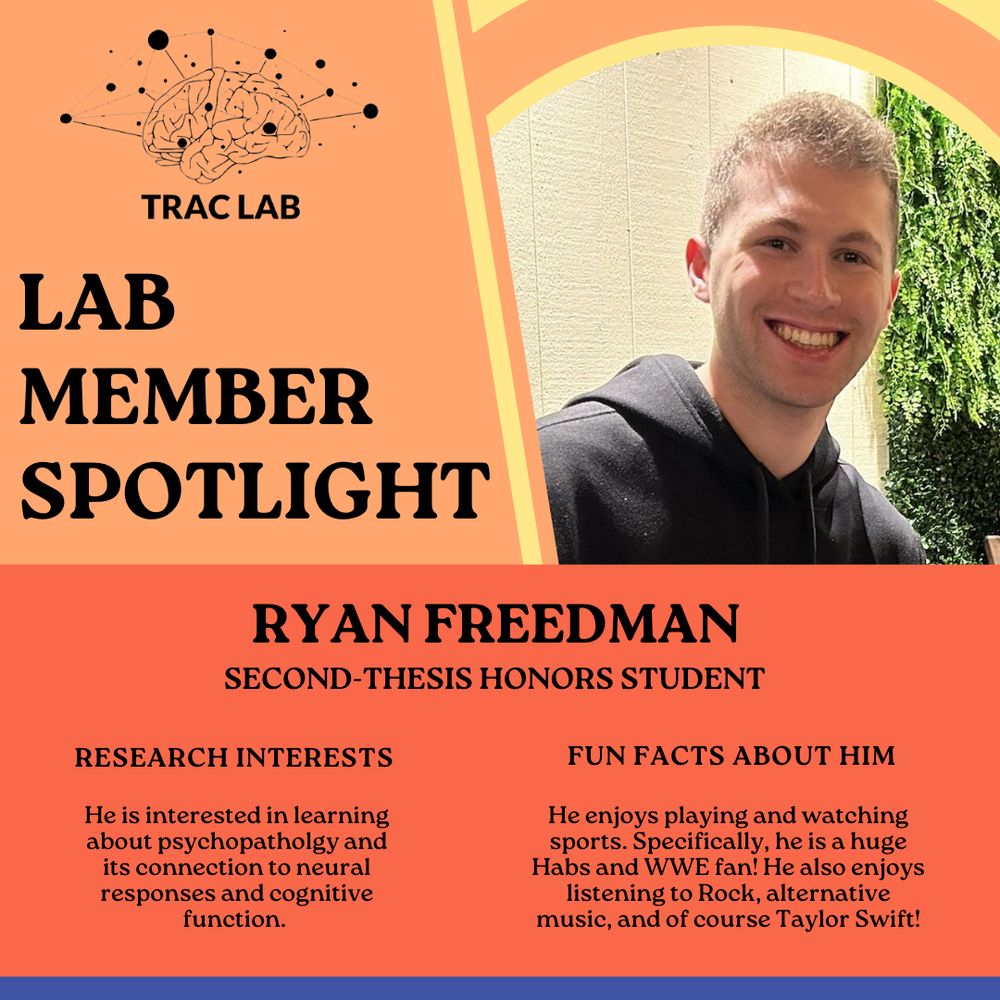
Our next RA spotlight of the year is for Ryan, an honors student at the lab who is interested in neural markers of psychopathology symptoms.
This year, the TRAC Lab will be posting bi-weekly posts featuring our spectacular Research Assistants!
14.04.2025 02:40 — 👍 0 🔁 0 💬 0 📌 0
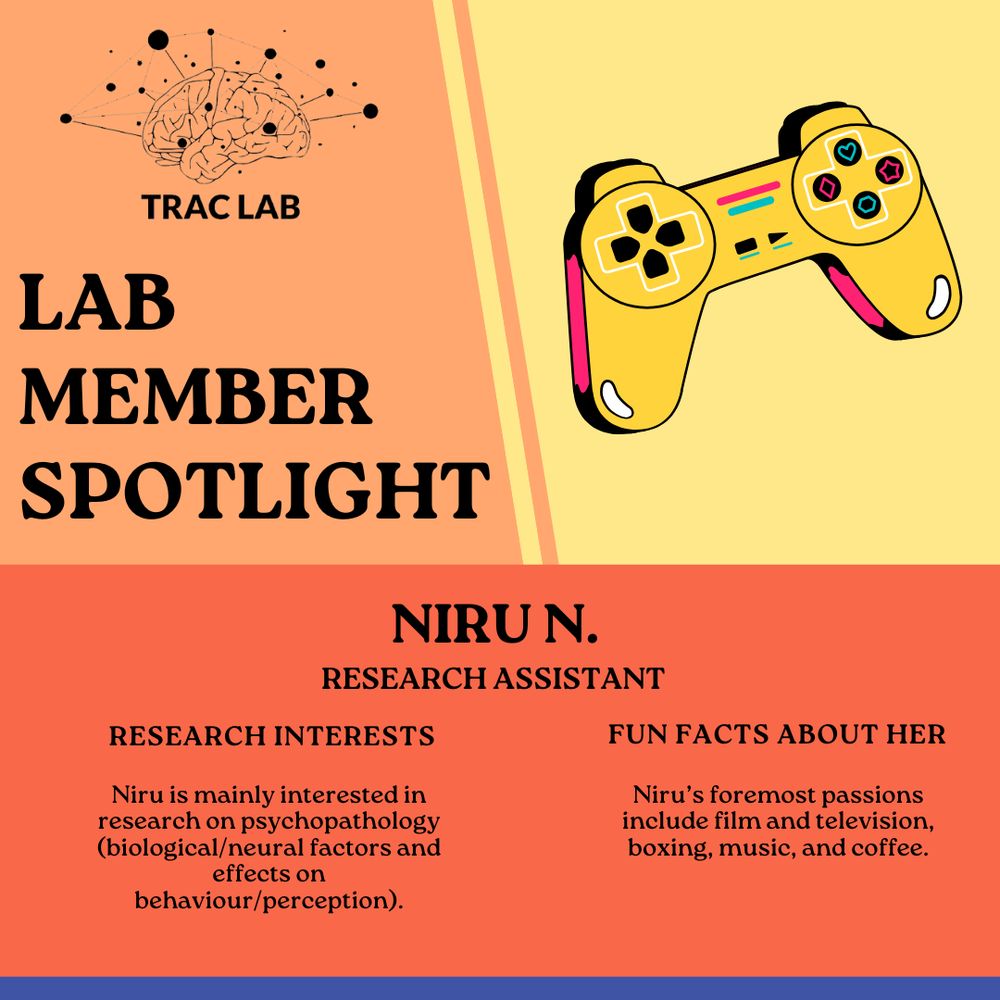
A digital graphic with LAB MEMBER SPOTLIGHT at the top. Besides the title is a graphic of a video-game controller. Underneath is a section describing Niru as a research assistant. Research interests: Niru is mainly interested in research on psychopathology (biological/neural factosr and effects on behaviour/perception). Fun facts about them: Niru's foremost passions include film, television, boxing, music, and coffee.
Our next RA spotlight of the year is for Niru, a research assistant at the lab who is interested in biological and neural factors in psychopathology research.
This year, the TRAC Lab will be posting bi-weekly posts featuring our tireless Research Assistants!
07.04.2025 16:41 — 👍 0 🔁 0 💬 0 📌 0
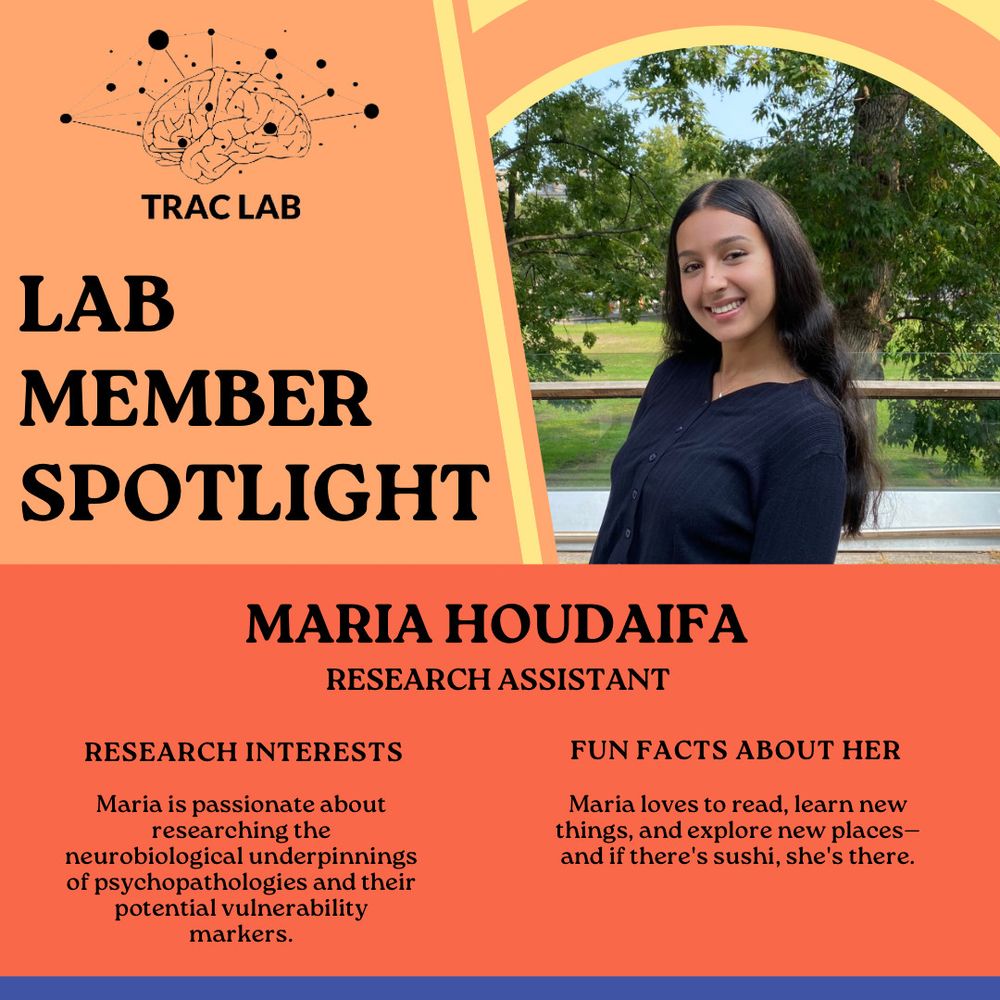
Our next RA spotlight of the year is for Maria, a research assistant at the lab who is passionate about research of the intersection between neuropsychology and psychopathology.
This year, the TRAC Lab will be posting bi-weekly posts featuring our tireless Research Assistants!
07.04.2025 01:11 — 👍 0 🔁 0 💬 0 📌 0
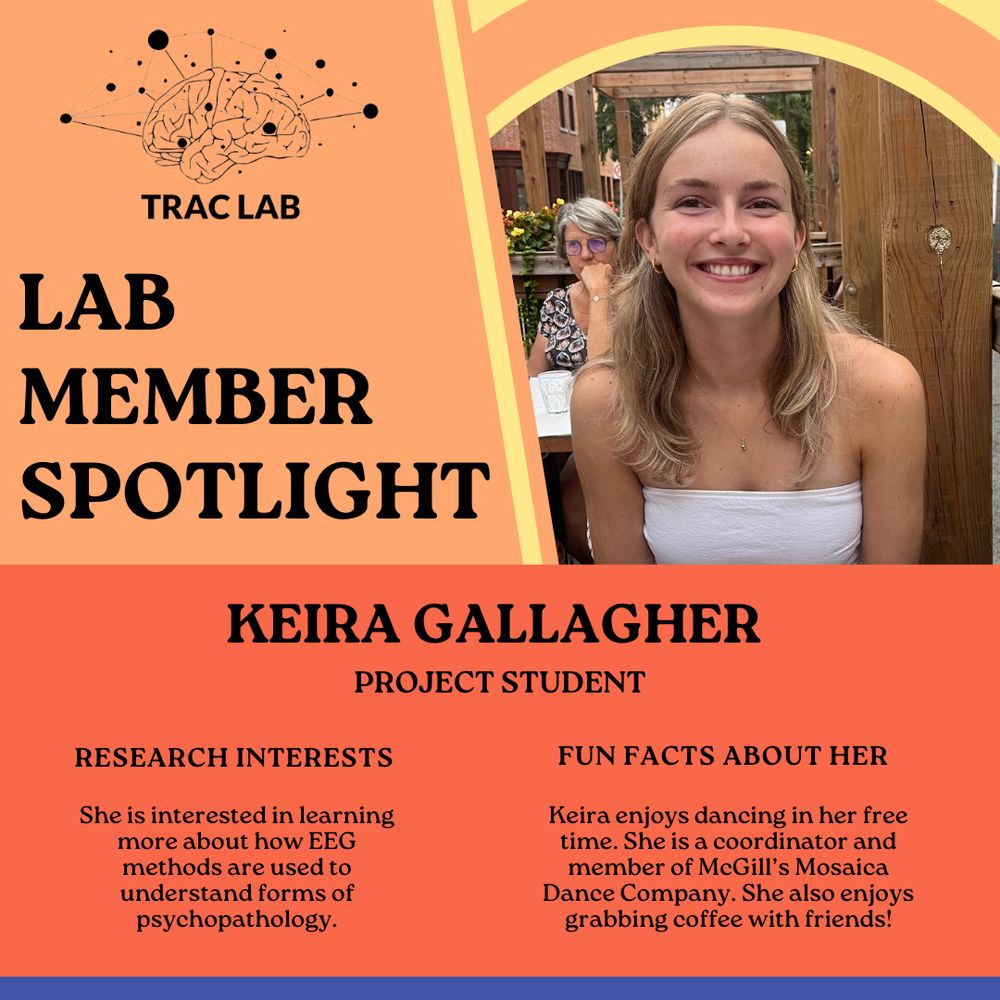
A digital graphic with LAB MEMBER SPOTLIGHT at the top. Besides the title is a picture of Keira Gallagher. Underneath is a section describing Keira as a research assistant. Research interests: Keira is interested in learning about how EEG methods are used to understand forms of psychopathology. Fun facts about her: Keira enjoys dancing in her free time. She is a coordinator and member of McGill's Mosaica Dance Company. She also enjoys grabbing coffee with friends!
Our next RA spotlight of the year is for Keira, a project student at the lab who is particularly interested the use of EEG methods for psychopathology!
This year, the TRAC Lab will be posting bi-weekly posts featuring our tireless Research Assistants!
02.04.2025 16:51 — 👍 0 🔁 0 💬 0 📌 0
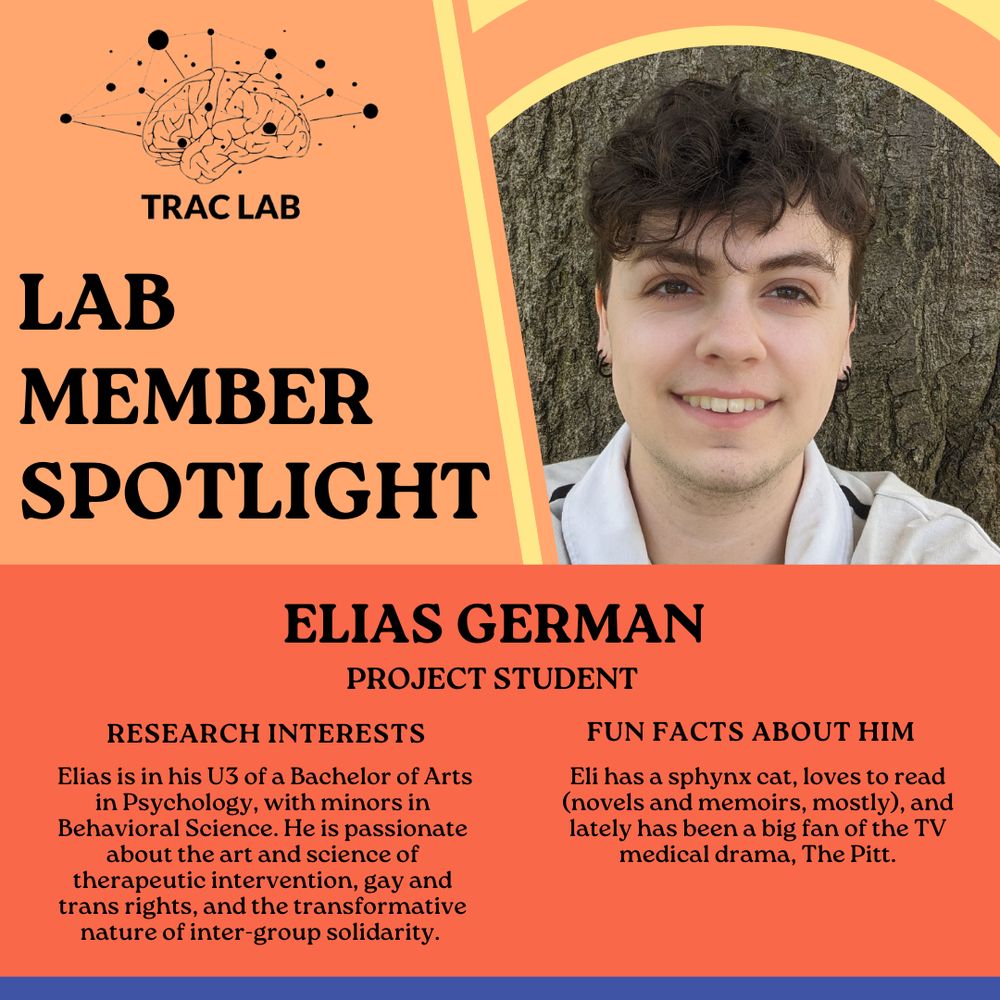
Our next RA spotlight of the year is for Elias, a project student at the lab who is particularly interested in translational research on depression!
This year, the TRAC Lab will be posting bi-weekly posts featuring our tireless Research Assistants!
28.03.2025 16:46 — 👍 0 🔁 0 💬 0 📌 0
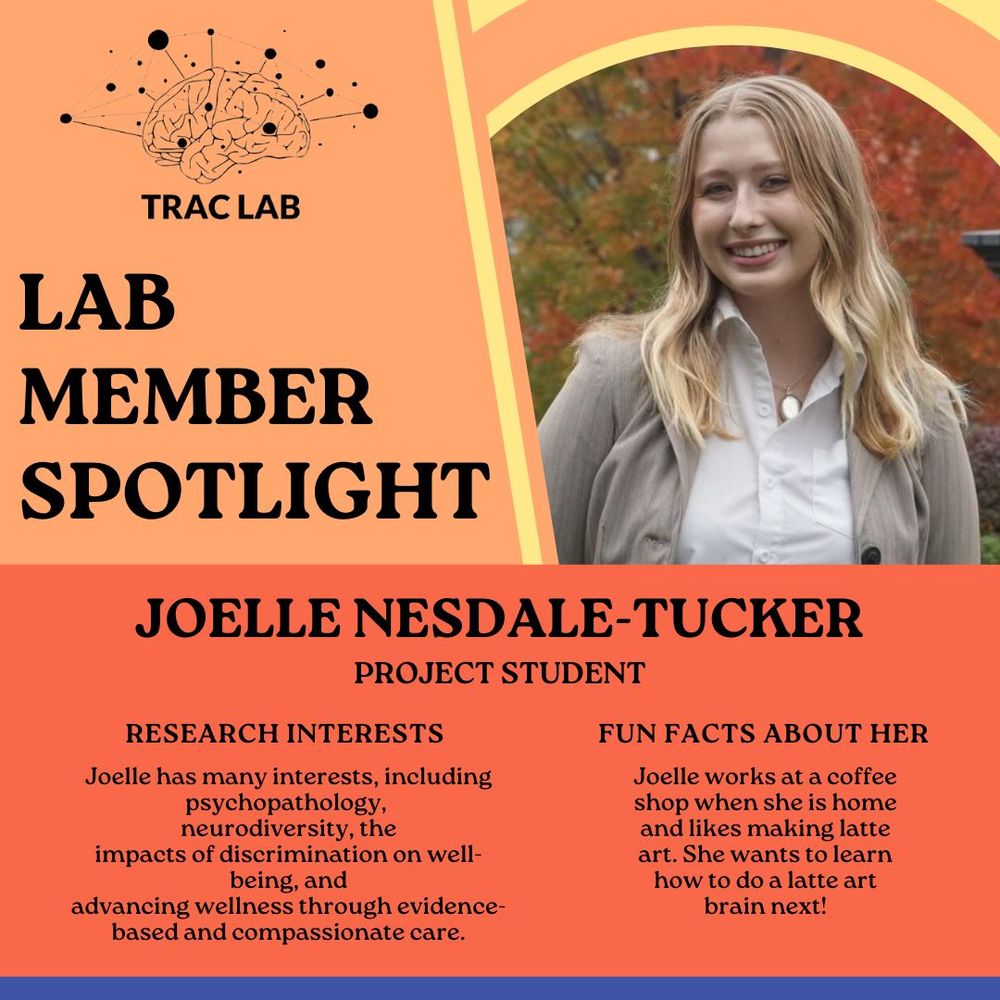
A digital graphic with LAB MEMBER SPOTLIGHT at the top. Besides the title is a picture of JOELLE NESDALE-TUCKER. Underneath is a section describing Joelle as a research assistant. Research interests: Joelle has many interests, including psychopathology, neurodiversity, theimpacts of discrimination on well-being, andadvancing wellness through evidence-based and compassionate care.
Fun facts about her: Joelle works at a coffee shop when she is home and likes making latte art. She wants to learn how to do a latte art brain next!
Our next RA spotlight of the year is for Joelle, a project student at the lab who is interested in the impact of discrimination of diversity on well-being, among other things!
This year, the TRAC Lab will be posting bi-weekly posts featuring our tireless Research Assistants!
26.03.2025 14:53 — 👍 3 🔁 1 💬 0 📌 0
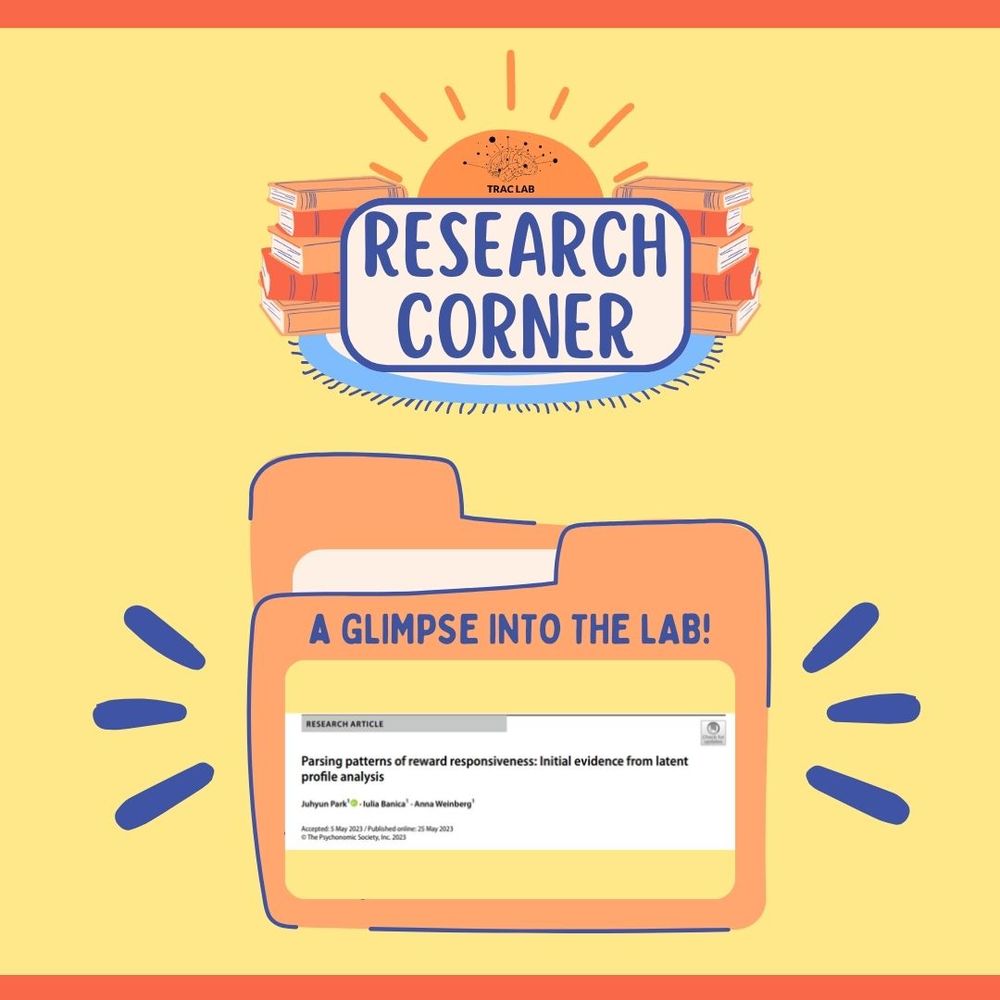
A digital graphic with RESEARCH CORNER written at the top. Below, a folder labeled A GLIMPSE INTO THE LAB! contains a screenshot of a research article on reward responsiveness. Beneath this, a folder graphic contains the phrase A GLIMPSE INTO THE LAB! and a screenshot of a research article titled Parsing patterns of reward responsiveness: Initial evidence from latent profile analysis
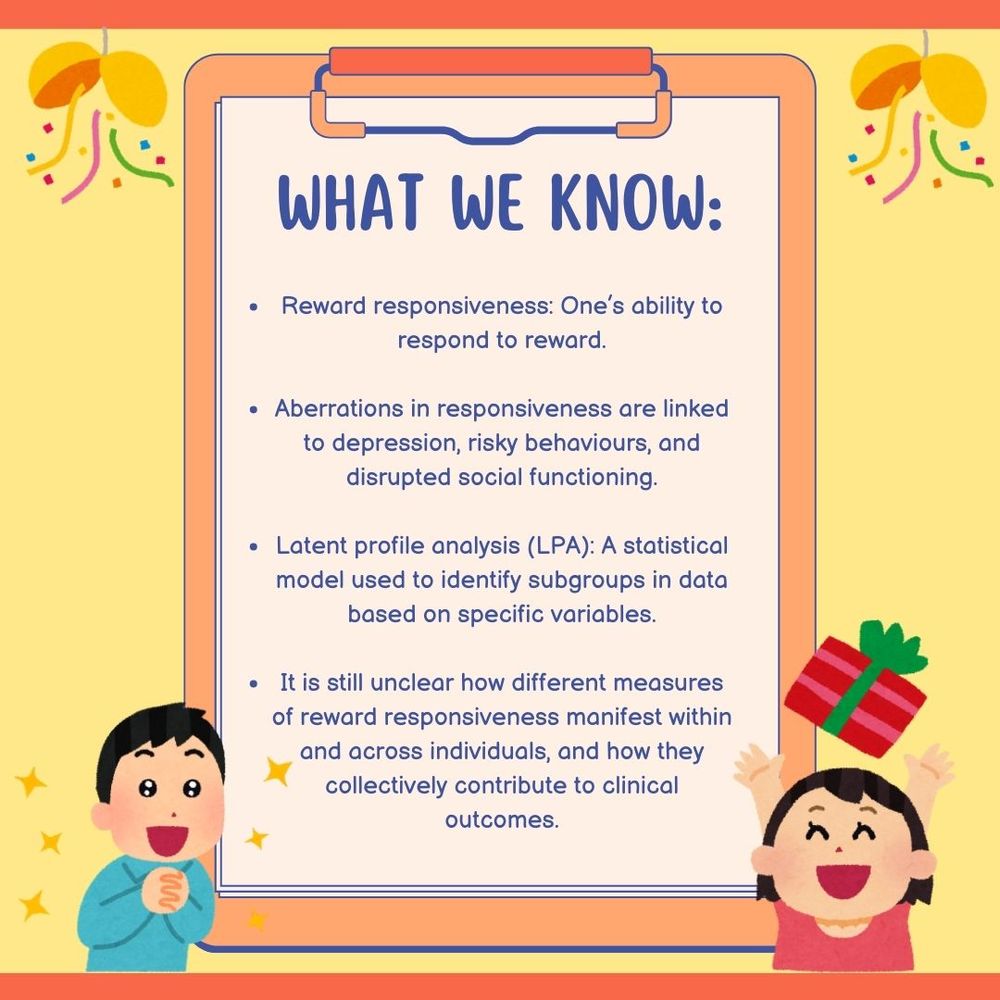
A clipboard-style infographic titled WHAT WE KNOW lists
• Reward responsiveness: One’s ability to respond to reward.
• Aberrations in responsiveness are linked to depression, risky behaviours, and disrupted social functioning.
• Latent profile analysis (LPA): A statistical model used to identify subgroups in data based on specific variables.
• It is still unclear how different measures of reward responsiveness manifest within and across individuals, and how they collectively contribute to clinical outcomes.
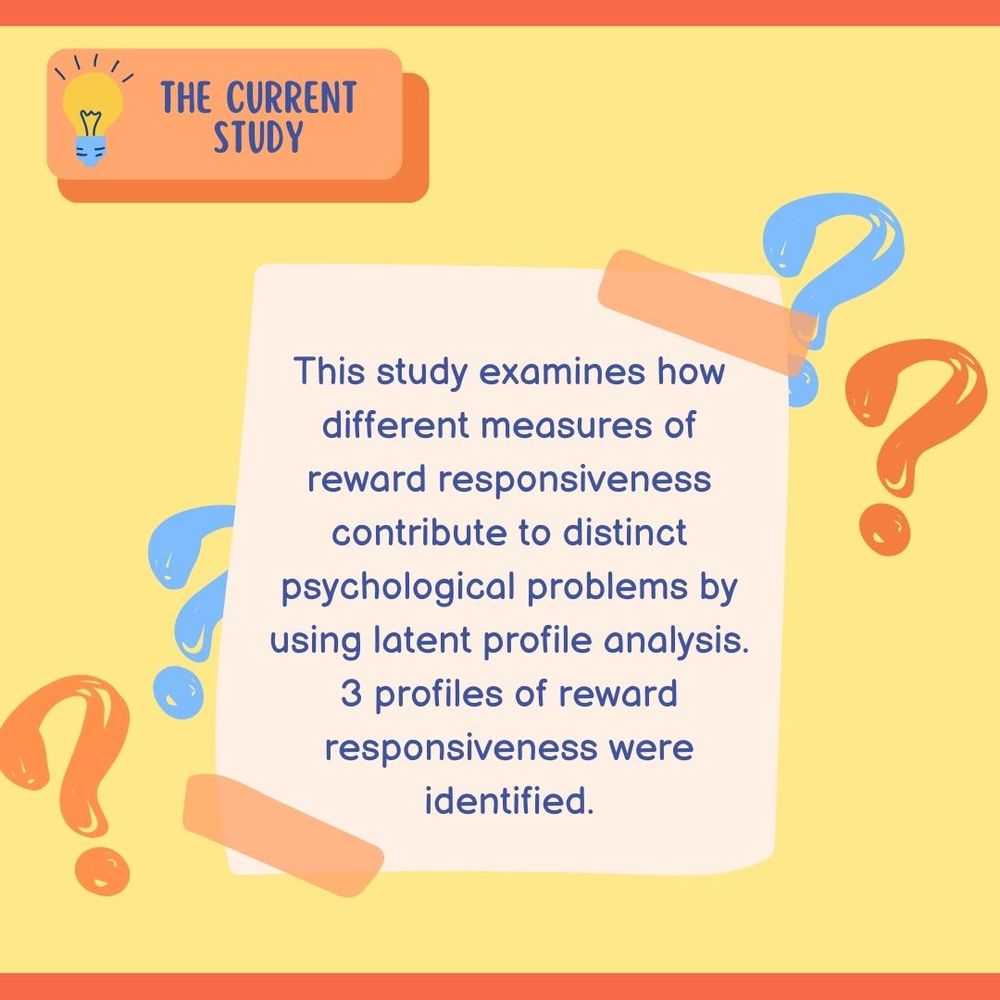
A graphic titled THE CURRENT STUDY with a graphic reading: This study examines how different measures of reward responsiveness contribute to distinct psychological problems by using latent profile analysis. 3 profiles of reward responsiveness were identified.
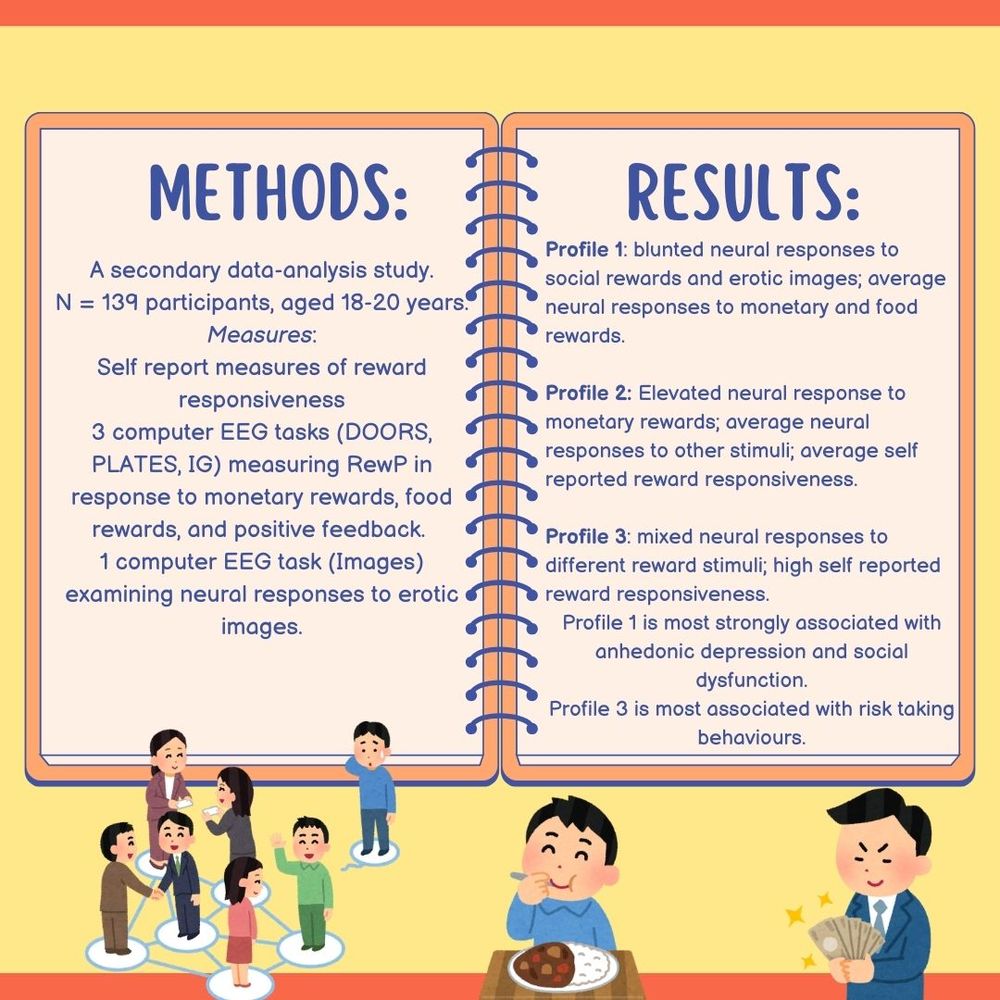
A notebook-style infographic lays out the findings and methods of the study:
METHODS: A secondary data-analysis study. N = 139 participants, aged 18-20 years.
Measures:
Self report measures of reward responsiveness
3 computer EEG tasks (DOORS, PLATES, IG) measuring RewP in response to monetary rewards, food rewards, and positive feedback.
1 computer EEG task (Images) examining neural responses to erotic images.
RESULTS:
Profile 1: blunted neural responses to social rewards and erotic images; average neural responses to monetary and food rewards.
Profile 2: Elevated neural response to monetary rewards; average neural responses to other stimuli; average self reported reward responsiveness.
Profile 3: mixed neural responses to different reward stimuli; high self reported reward responsiveness.
Profile 1 is most strongly associated with anhedonic depression and social dysfunction.
Profile 3 is most associated with risk taking behaviours.
Welcome back to the Research Corner! Today we’re looking at how latent profile analysis can be used to create profiles of reward responsiveness and how those profiles contribute to psychological problems.
26.03.2025 14:44 — 👍 1 🔁 0 💬 0 📌 0
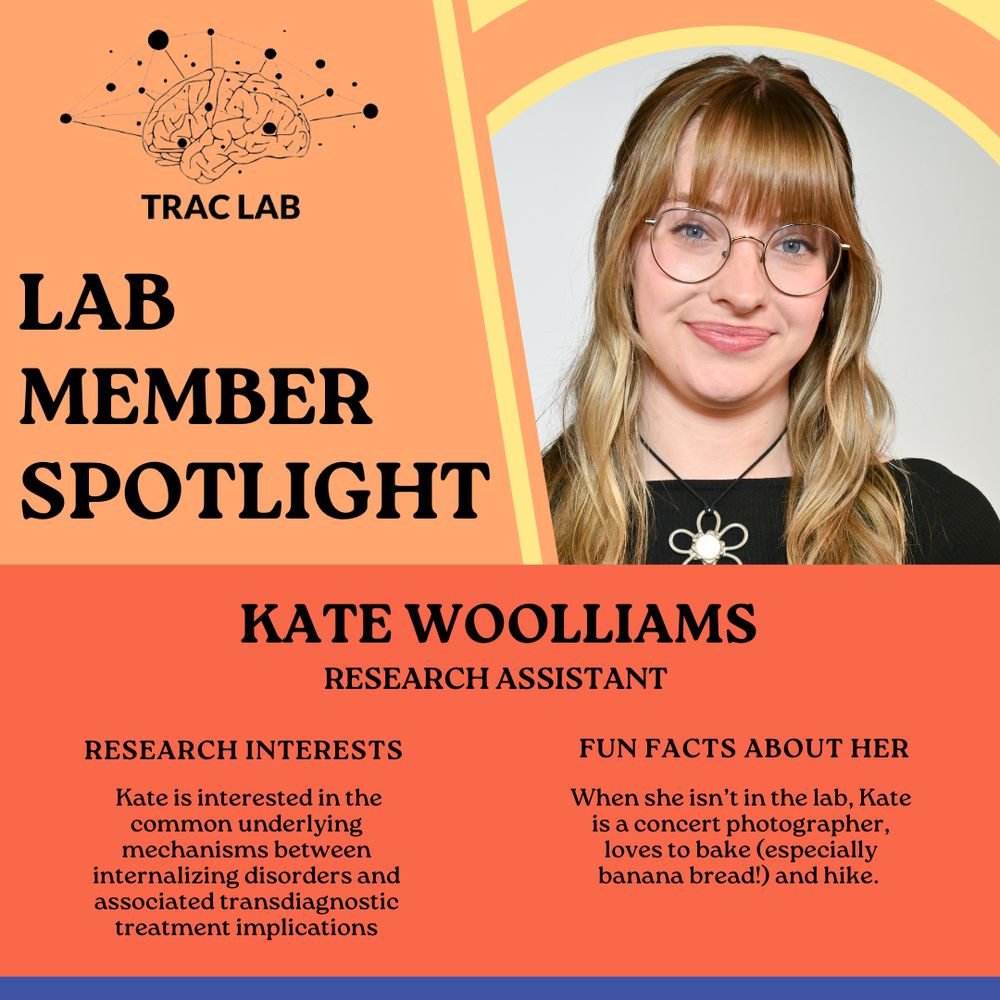
A digital graphic with LAB MEMBER SPOTLIGHT at the top. Besides the title is a picture of Kate Woolliams. Underneath is a section describing Kate as a research assistant. Research interests: Kate is interested in the common underlying mechanisms between internalizing disorders and associated transdiagnostic treatment implications. Fun facts about her: When she isn't lab, Kate is a concert photographer, loves to bake (especially banana bread!) and hike.
Our next RA spotlight for the year is for Kate, a research assistant interested in knowing more about mechanisms underlying internalizing disorders.
Keep an eye out for our RA Spotlights in your feed to see behind-the-scenes of the TRAC Lab!
24.03.2025 22:14 — 👍 2 🔁 1 💬 0 📌 0
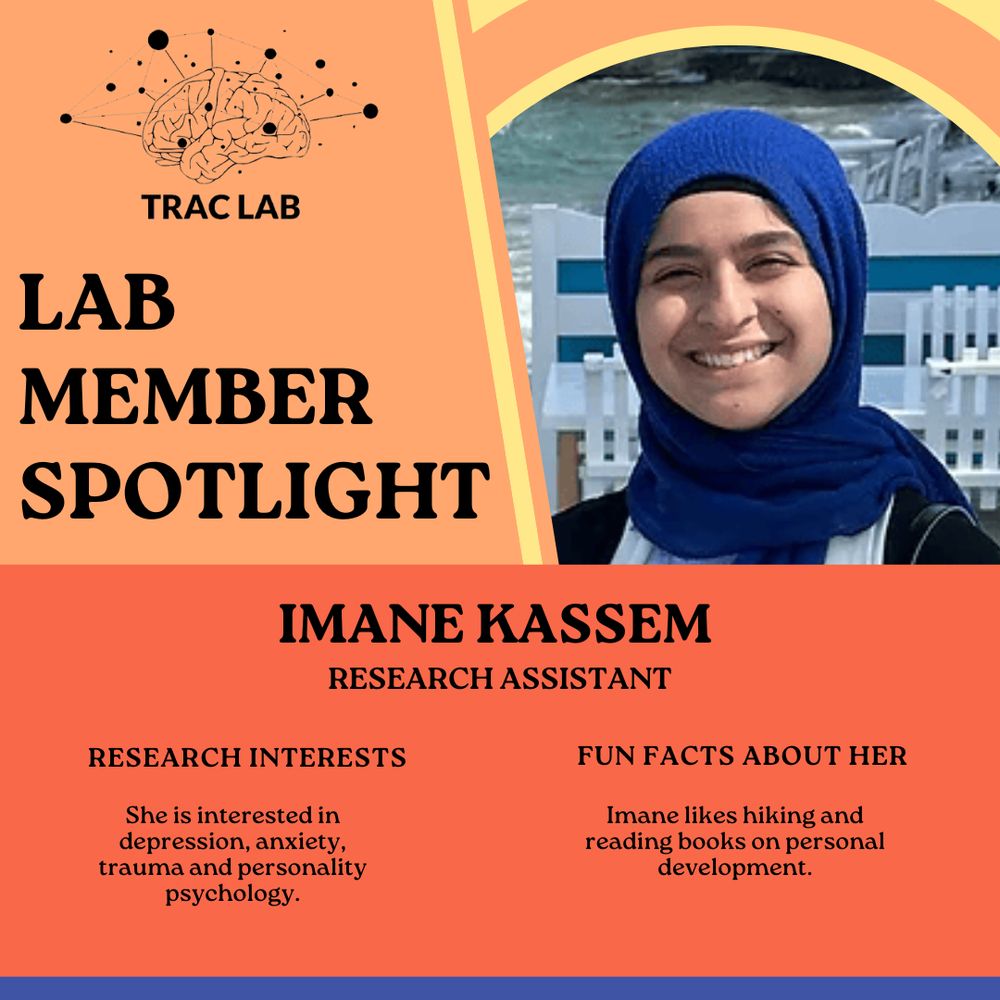
A digital graphic with LAB MEMBER SPOTLIGHT at the top. Besides the title is a picture of Imane Kassem. Underneath is a section describing Imane as a research assistant. Research interests: She is interested in depression, anxiety, trauma, and personality psychology. Fun facts about her: Imane likes hiking and reading books on personal development
Our next RA spotlight for the year is for Imane, a research assistant with a passion for psychopathology research.
Keep an eye out for our RA Spotlights in your feed to see behind-the-scenes of the TRAC Lab!
17.03.2025 19:48 — 👍 1 🔁 0 💬 0 📌 0
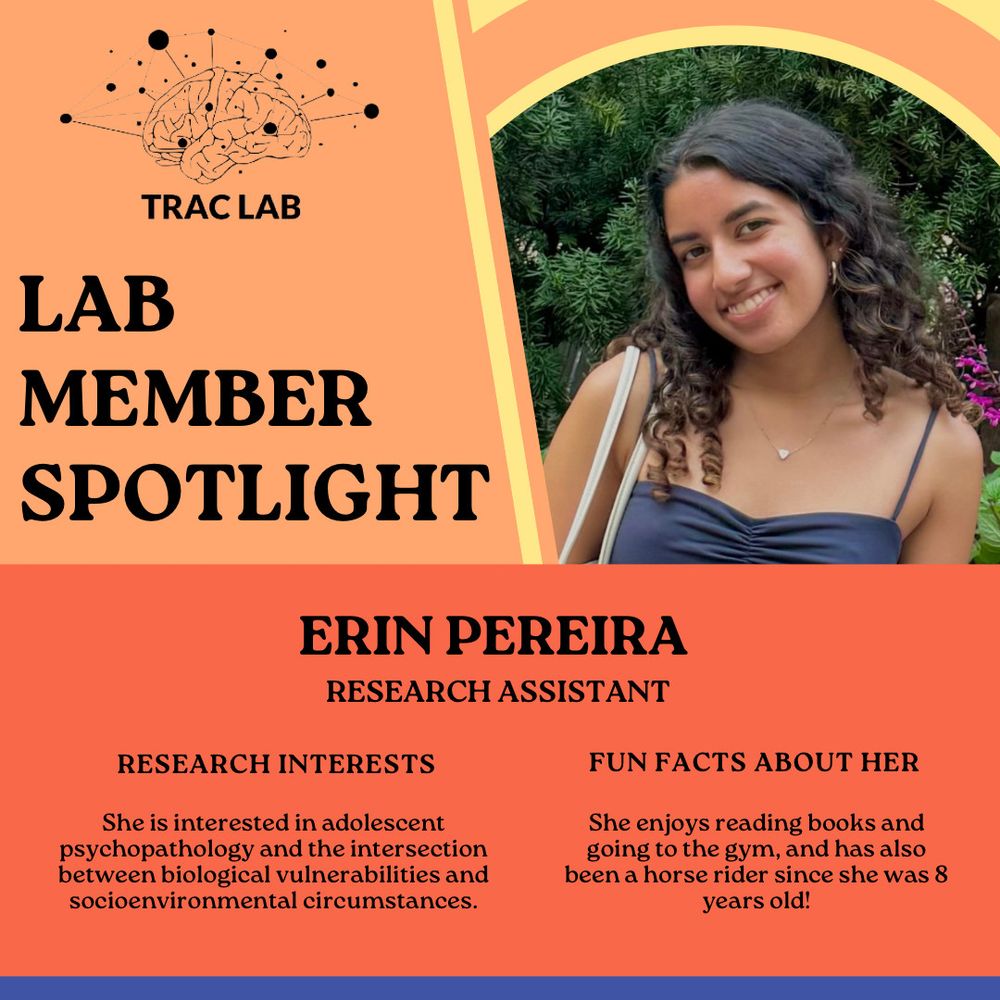
*TRAC Lab Spotlight* Our next RA spotlight for the year is for Erin, U3 McGill student of Psychology.
Keep an eye out for our RA Spotlights in your feed to see behind-the-scenes of the TRAC Lab!
15.03.2025 22:25 — 👍 2 🔁 0 💬 0 📌 0
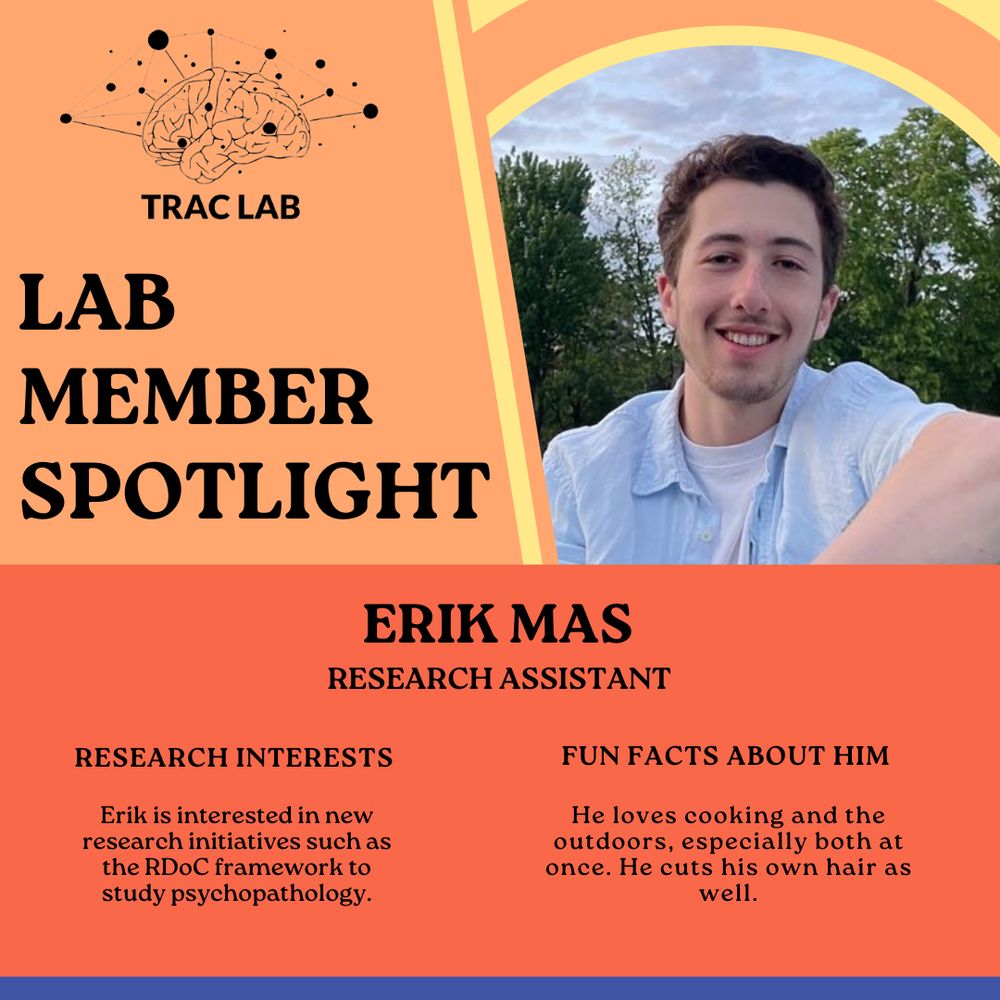
A digital graphic with LAB MEMBER SPOTLIGHT at the top. Besides the title is a picture of Erik Mas. Underneath is a section describing Erik Mas as a research assistant. Research interests: Erik is interested in new research initiatives such as the RDoC framework to study psychopathology. Fun facts about him: He loves cooking and the outdoors, especially both at once. He cuts his own hair as well.
Our next RA spotlight of the year is for Erik, a research assistant at the lab who is interested RDoC focused research initiatives for psychopathology.
This year, the TRAC Lab will be posting bi-weekly posts featuring our tireless Research Assistants!
10.03.2025 19:22 — 👍 1 🔁 0 💬 0 📌 0
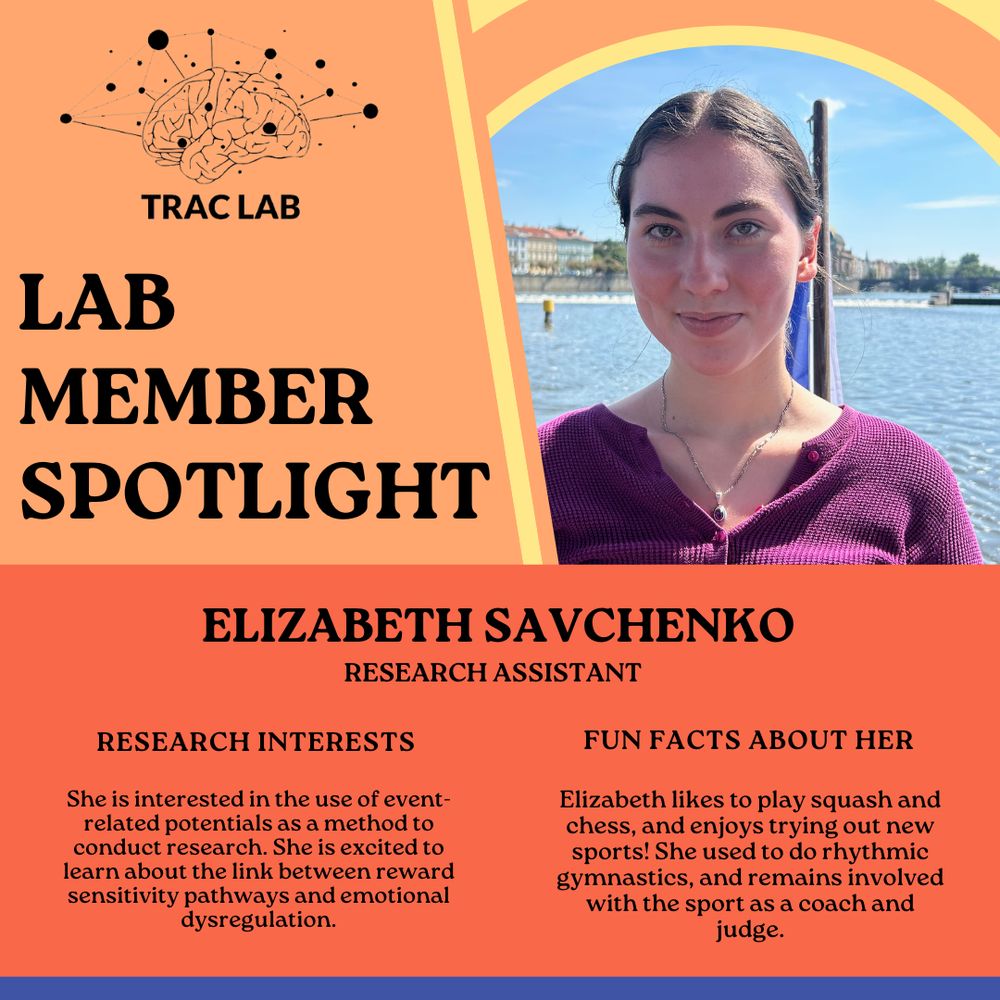
A digital graphic with LAB MEMBER SPOTLIGHT at the top. Besides the title is a picture of Elizabeth Savchenko. Underneath is a section describing Elizabeth Savchenko as a research assistant. Research interests: She is interested in the use of event-related potentials as a method to conduct research. She is excited to learn about the link between reward sensitivity and emotional dysregulation. Fun facts about her: Elizabeth likes to play squash and chess, and enjoys trying out new sports! She used to do rhythmic gymnastics, and remains involved with the sport as a coach and judge.
Our fourth RA spotlight of the year is for Elizabeth, who is one of our many dedicated research assistants! She is especially interested in the use of ERPs as a methodology.
This year, the TRAC Lab will be posting bi-weekly posts featuring our tireless Research Assistants!
07.03.2025 17:32 — 👍 2 🔁 0 💬 0 📌 0
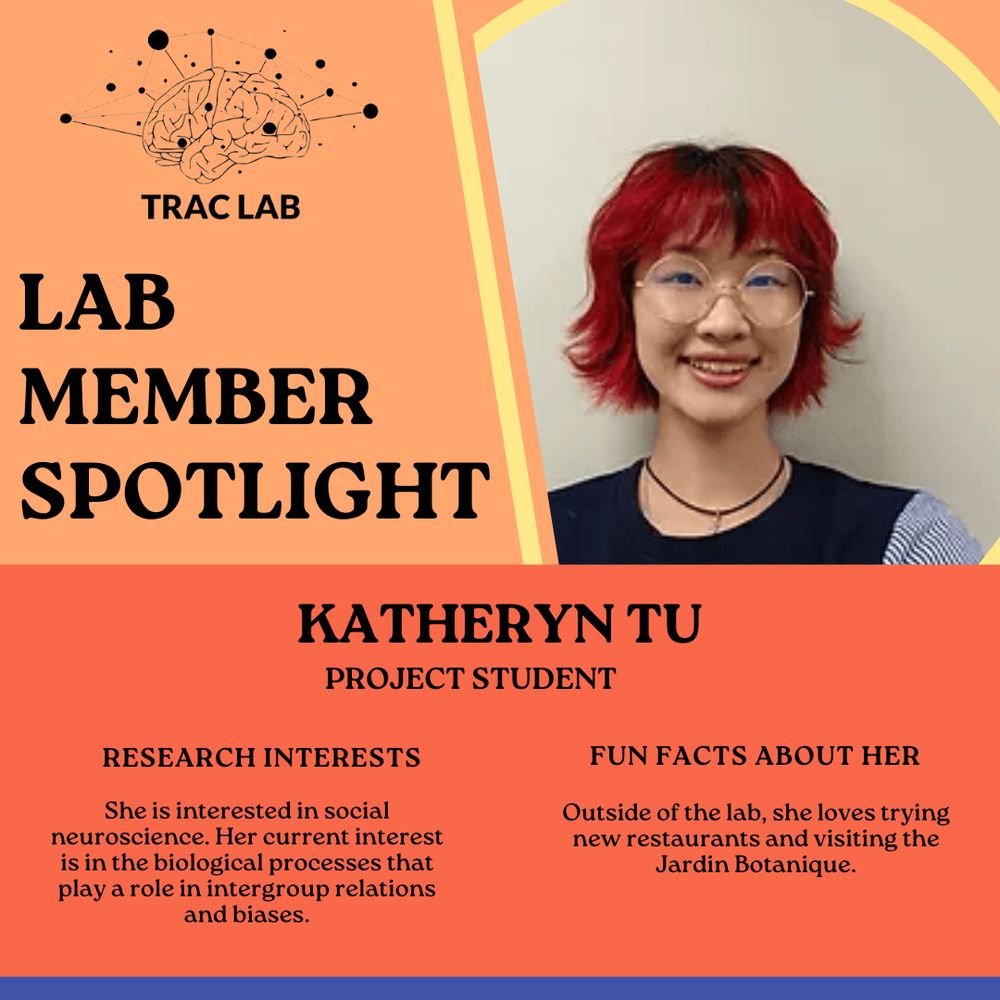
Our third RA spotlight of the year is for Katheryn, who is also one of our many project students! Kat is particularly interested in the intersection between social psychology and neuropsychology.
This year, the TRAC Lab will be posting bi-weekly posts featuring our tireless Research Assistants!
03.03.2025 23:44 — 👍 1 🔁 0 💬 0 📌 0
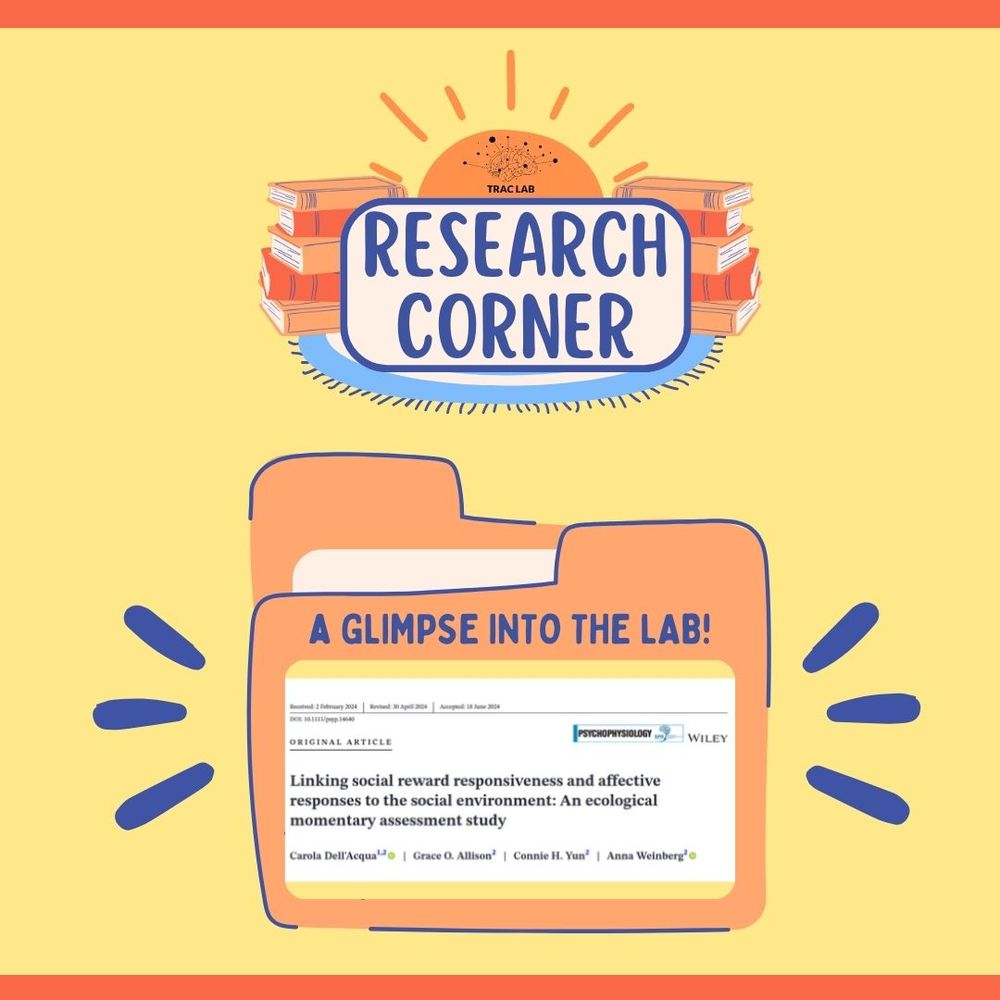
A digital graphic with RESEARCH CORNER written at the top. Below, a folder labeled A GLIMPSE INTO THE LAB! contains a screenshot of a research article on social reward responsiveness. Beneath this, a folder graphic contains the phrase A GLIMPSE INTO THE LAB! and a screenshot of a research article titled Linking social reward responsiveness and affective responses to the social environment: An ecological momentary assessment study.

A clipboard-style infographic titled WHAT WE KNOW lists:
Social Support: The perception or experience that one is loved and cared for by others.
People who receive social support rate higher on psychological and physical health measures.
Neural responses to positive social feedback (social reward) may relate to social functioning.
RewP: a neural correlate of social reward processing.
On the left, small illustrated people help each other climb blocks, representing social support.
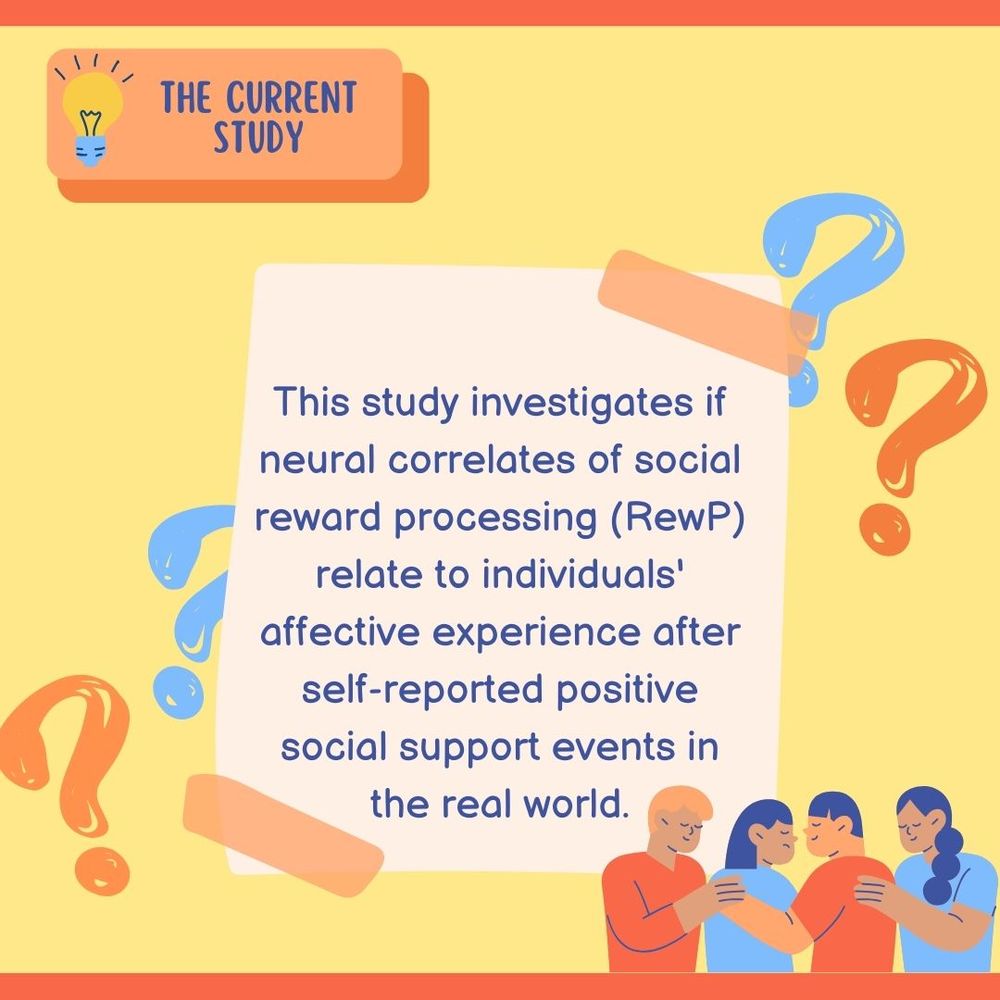
A graphic titled THE CURRENT STUDY with a graphic reading:
This study investigates if neural correlates of social reward processing (RewP) relate to individuals' affective experience after self-reported positive social support events in the real world.
Illustrated people hug in the bottom right corner.
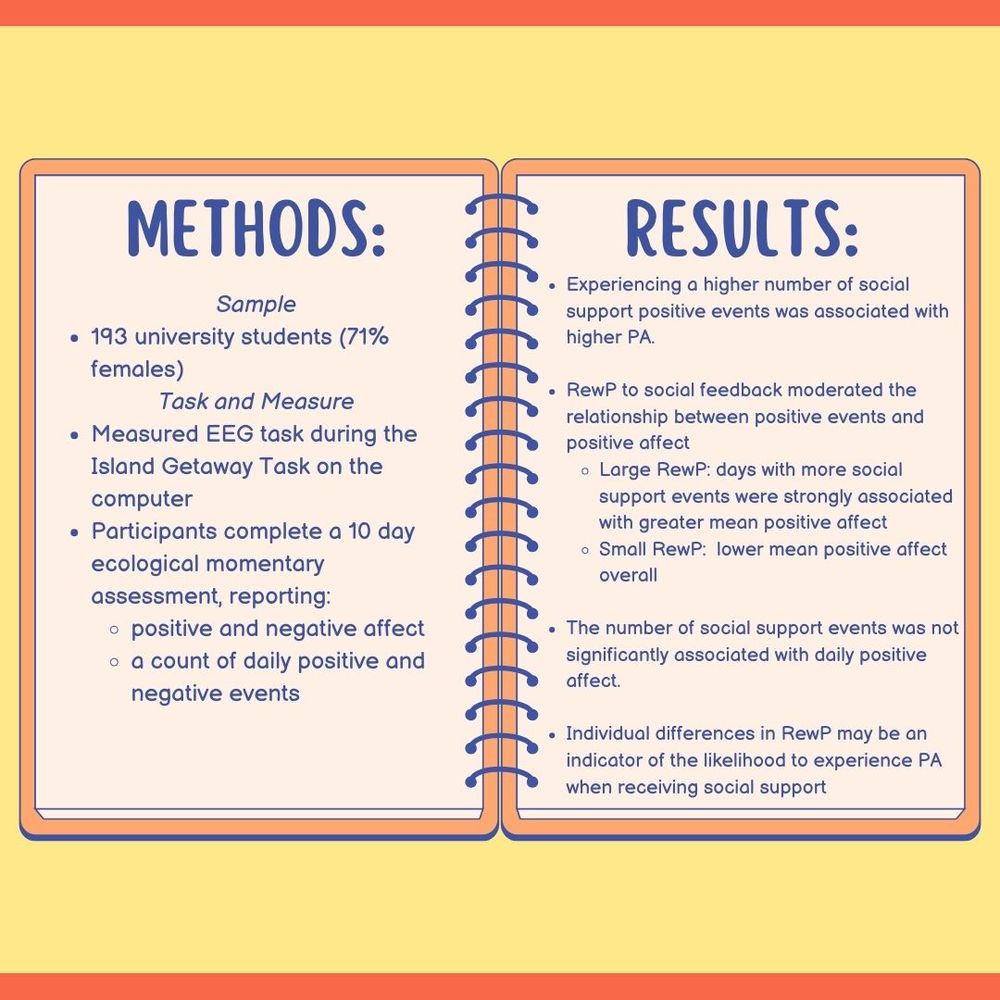
A notebook-style infographic lays out the findings and methods of the study:
METHODS:
Sample: 193 university students (71% female).
Task and Measure: EEG task during the Island Getaway Task.
10-day ecological momentary assessment, reporting:
Positive and negative affect.
Count of daily positive and negative events.
RESULTS:
More social support positive events = higher positive affect (PA).
RewP moderated the relationship between positive events and affect:
Large RewP: More support events → Greater mean PA.
Small RewP: Lower mean PA overall.
The number of social support events was not significantly linked to daily PA.
Individual RewP differences may indicate the likelihood of experiencing PA from social support.
Welcome to TRAC Lab's Research Corner! We will be highlighting some the incredible work done by our team. Stay informed on some of the work we do by following us!
27.02.2025 14:18 — 👍 2 🔁 0 💬 0 📌 0
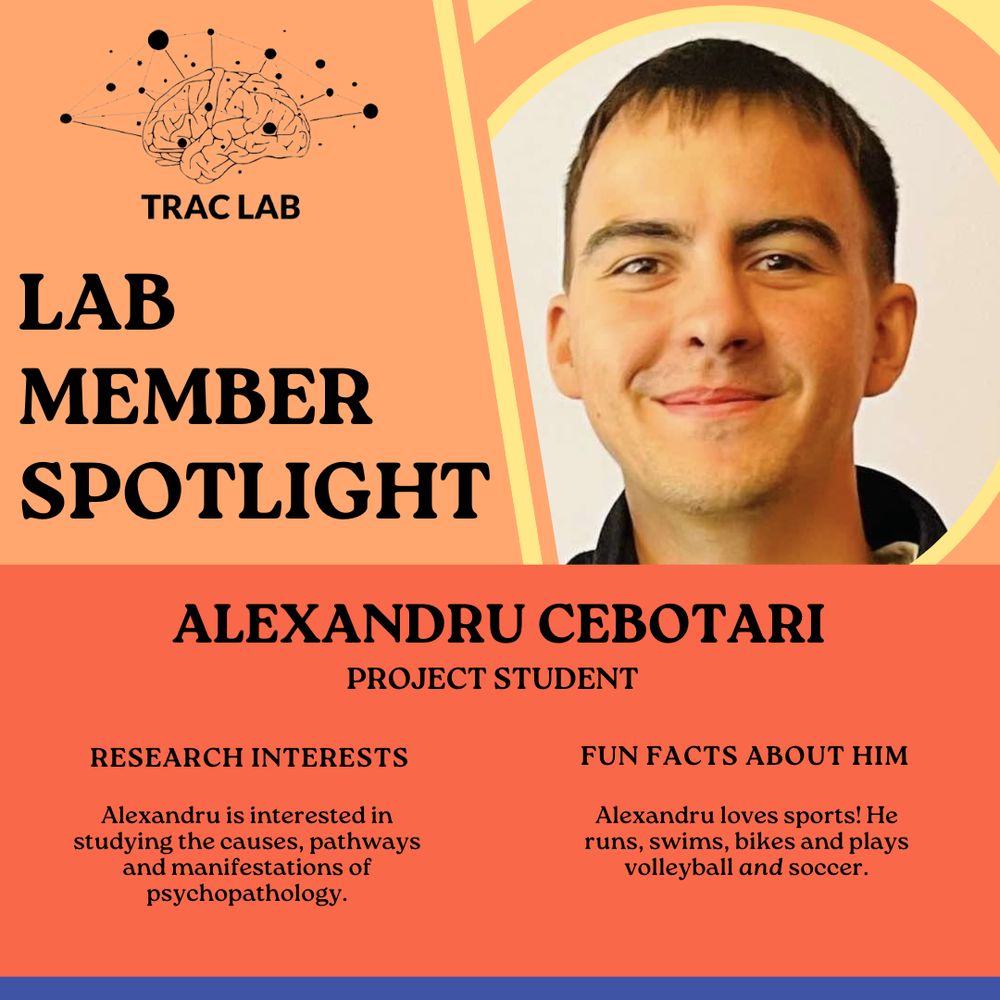
Lab member spotlight: Alexandru Cebotari, project student. Research interests: Alexandru is interested in studying the causes, pathways, and manifestations of psychopathology. Fun facts about him: Alexandru loves sports! He runs, swims, bikes, and plays volleyball and soccer.
Our second RA spotlight for the year is for Alexandru, who is also one of our many project students!
This year, the TRAC Lab will be posting bi-weekly posts featuring our tireless Research Assistants. Keep an eye out for our RA Spotlights in your feed to see behind-the-scenes of the TRAC Lab.
24.02.2025 21:13 — 👍 1 🔁 0 💬 0 📌 0
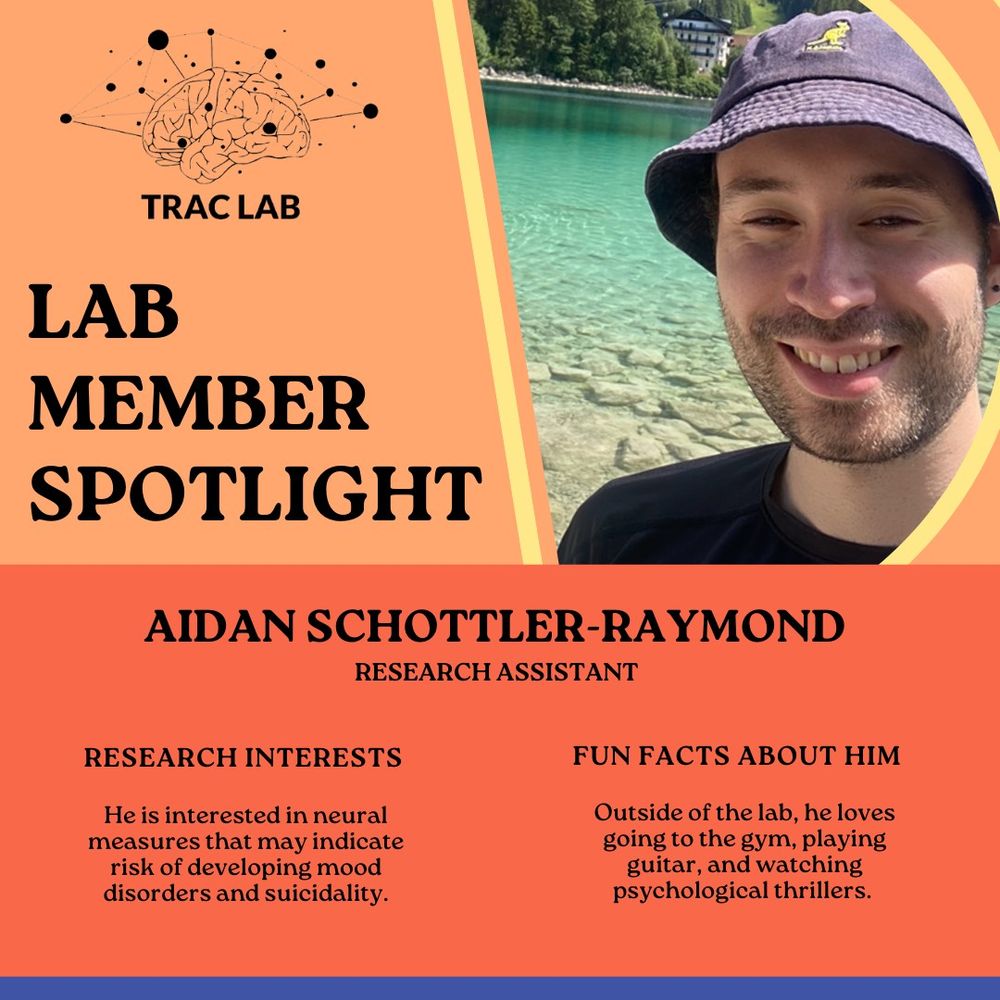
This is the TRAC Lab's first Undergraduate RA spotlight for our RA Aidan! Stay up to date with the TRAC Lab Members and our research by checking in on our Bluesky weekly 🥳
23.02.2025 18:27 — 👍 3 🔁 1 💬 0 📌 0
Grad Student in Comp Sci @ UIUC @uofigrainger.bsky.social | Former Sr. Research Asst. in Radiation Physics @ Univ. of Texas MD Anderson Cancer Center @mdanderson.bsky.social, developed AI for RPA https://rpa.mdanderson.org | 🏳️🌈 he/him | Views are my own
Clinical neuroscientist at Texas A&M
Associate Professor of Psychology, Penn State University, Director, Families, Affective Neuroscience, and Mood Disorders (FAM) lab. https://famlab.la.psu.edu/
Assistant professor @NotreDame using psychophys to study emotions and life | Clinical psych PhD from @PurdueHHS postdoc from @VanderbiltU
sprweb.org
Join us in Montréal for #2025SPR - registration is now open!
https://spr.joynmeeting.com/v2/
We study infant social behavior
Directed by @simpson.bsky.social, Psychology Department @UMiamiPsych.bsky.social, University of Miami @UnivMiami.bsky.social
https://linktr.ee/socialcoglab
Cognitive neuroscientist | Clinical neuropsychologist in training at @uqam.ca | via @umontreal.ca, @yale.edu, & @mcgill.ca | Cognitive electrophysiology, neurodevelopment, Tourette syndrome, disruptive behaviors
The goal of the SPARK Society is to create networks and promote the professional development of historically excluded scholars of African American/Black, Latina/o/e American, and Native American heritage in Cognitive Psychology/Sciences. sparksociety.org
The MAClab is led by Dr. Annmarie MacNamara at Texas A&M University
https://linktr.ee/MAClab_brain
Clinical scientists translating affective neuroscience to improve depression treatment/prevention. PI: Autumn Kujawa (posts by Autumn or Georgia Moon)
McGill Psychology Department's research, news and more!
Associate Professor of clinical psychology at McGill University
official Bluesky account (check username👆)
Bugs, feature requests, feedback: support@bsky.app























